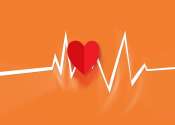Frailty in young heart attack patients linked to higher risk of early death
Researchers have uncovered a major blind spot in the way doctors assess future health risk in young adults who suffer a heart attack.
22 hours ago
0
0
Researchers have uncovered a major blind spot in the way doctors assess future health risk in young adults who suffer a heart attack.
22 hours ago
0
0

A simple neck scan can identify men with double the risk of heart failure, according to research led by University College London.
Nov 26, 2025
0
4

Nearly half of all adults in the U.S. have high blood pressure. "High blood pressure (also called hypertension) puts you at risk of many life-threatening problems," says Rachel Goodman, MD, Chief Cardiology Fellow at Tufts ...
Nov 24, 2025
0
0

Current cardiac screening tools used to prevent heart attacks fail to identify nearly half of the people who are actually at risk of having one, according to a new study led by Mount Sinai researchers.
Nov 21, 2025
0
81

3D printed blood vessels on glass that mimic blood vessel anatomy and the fluid dynamics of blood flow could be an invaluable tool in studying the causes of stroke, new research from a University of Sydney team has found ...
Nov 19, 2025
0
29

The likelihood of high blood pressure is clearly higher among people who have both sleep apnea and insomnia. This is shown by a study from the University of Gothenburg.
Nov 18, 2025
0
0

A new patch developed by Texas A&M University researcher Dr. Ke Huang may offer a way to help the heart heal after a heart attack. The patch uses a unique microneedle system to deliver a therapeutic molecule directly to damaged ...
Nov 17, 2025
0
16

The U.S. Food and Drug Administration (FDA) is eliminating the prominent "black box" warnings on many hormone replacement therapy (HRT) medications, signaling a major shift in how the treatment is viewed for menopausal women.
Nov 15, 2025
0
0

A blocked coronary artery causing an acute heart attack must be opened immediately with a stent procedure. However, if other coronary arteries also appear to be narrowed, it is safe to wait and treat those later. This approach ...
Nov 13, 2025
0
21

A widely used, inexpensive gout drug could reduce heart attacks and strokes in people with cardiovascular disease, according to a new review.
Nov 12, 2025
0
27

Myocardial infarction (MI) or acute myocardial infarction (AMI), commonly known as a heart attack, results from the interruption of blood supply to a part of the heart, causing heart cells to die. This is most commonly due to occlusion (blockage) of a coronary artery following the rupture of a vulnerable atherosclerotic plaque, which is an unstable collection of lipids (cholesterol and fatty acids) and white blood cells (especially macrophages) in the wall of an artery. The resulting ischemia (restriction in blood supply) and ensuing oxygen shortage, if left untreated for a sufficient period of time, can cause damage or death (infarction) of heart muscle tissue (myocardium).
Classical symptoms of acute myocardial infarction include sudden chest pain (typically radiating to the left arm or left side of the neck), shortness of breath, nausea, vomiting, palpitations, sweating, and anxiety (often described as a sense of impending doom). Women may experience fewer typical symptoms than men, most commonly shortness of breath, weakness, a feeling of indigestion, and fatigue. Approximately one-quarter of all myocardial infarctions are "silent", that is without chest pain or other symptoms.
Among the diagnostic tests available to detect heart muscle damage are an electrocardiogram (ECG), echocardiography, cardiac MRI and various blood tests. The most often used blood markers are the creatine kinase-MB (CK-MB) fraction and the troponin levels. Immediate treatment for suspected acute myocardial infarction includes oxygen, aspirin, and sublingual nitroglycerin.
Most cases of STEMI (ST elevation MI) are treated with thrombolysis or percutaneous coronary intervention (PCI). NSTEMI (non-ST elevation MI) should be managed with medication, although PCI is often performed during hospital admission. In people who have multiple blockages and who are relatively stable, or in a few emergency cases, bypass surgery may be an option, especially in diabetics.
Heart attacks are the leading cause of death for both men and women worldwide. Important risk factors are previous cardiovascular disease, older age, tobacco smoking, high blood levels of certain lipids (triglycerides, low-density lipoprotein) and low levels of high density lipoprotein (HDL), diabetes, high blood pressure, obesity, chronic kidney disease, heart failure, excessive alcohol consumption, the abuse of certain drugs (such as cocaine and methamphetamine), and chronic high stress levels.
This text uses material from Wikipedia licensed under CC BY-SA